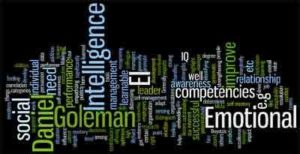 Emotional Intelligence can often be underrated when talking about leaders. We tend to value the stronger and more obvious “leader-like” traits such as confidence, decisiveness, and charisma. Emotional Intelligence or “EQ” starts with self-awareness and as Daniel Goleman points out in, “Why Self-Aware Leaders Are More Productive and Effective,” self-aware leaders are often much more productive than their peers.
Emotional Intelligence can often be underrated when talking about leaders. We tend to value the stronger and more obvious “leader-like” traits such as confidence, decisiveness, and charisma. Emotional Intelligence or “EQ” starts with self-awareness and as Daniel Goleman points out in, “Why Self-Aware Leaders Are More Productive and Effective,” self-aware leaders are often much more productive than their peers.
The adage “know thyself” is really what self-awareness means. If you don’t acknowledge both your good and bad traits, your character or skills, how can you build on those? The first step to this is to listen. Stop interrupting and interpreting what others tell you and really listen to what they have to say. Behavioral change can only start from an accurate assessment of what really is. Think of it like a car repair. If the car won’t start and the diagnosis is the battery has gone bad and you replace the starter, it still won’t start. If you are not self-aware and someone tells you that you don’t listen or that you aren’t empathetic and people perceive you as aloof, you will likely dismiss the feedback – precisely because you don’t listen and are not empathetic. Your response is likely to be negative to the person giving you this feedback rather than looking inward to consider how you might change.
Lack of self-awareness is more than a blind spot – we all have those. It is an inability or unwillingness to confront who we are or how we are seen. If we continue to be unaware, no other leadership traits will matter because we have an inaccurate perception of our strengths and weaknesses.
Think of it like the airplane instructions – put your own oxygen mask on first. In order to lead others, you must first look in the mirror. Working from a false sense of self will only lead to more falsity, which in turn leads to more unproductive behavior. It’s a vicious circle.
To begin the process of building your EQ skills and self-awareness, start by simply asking people how you are perceived or conduct a 360. You’ll get to see the gap between your view and that of your peers and direct reports. The greater the gap, the greater your lack of self-awareness. Just acknowledging the gap is a great starting point.
Great leaders know their strengths and their weaknesses. Self-awareness becomes the foundation for productivity because you begin to understand what skills you need on your team to create strength in the areas that you are weak. Take a hard look in the mirror and really see what others see. It’s a great start toward emotional intelligence and good leadership.
